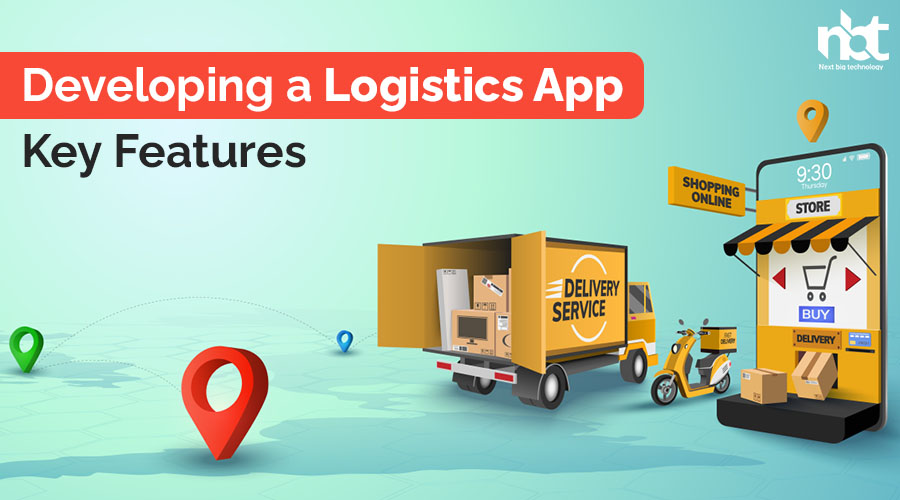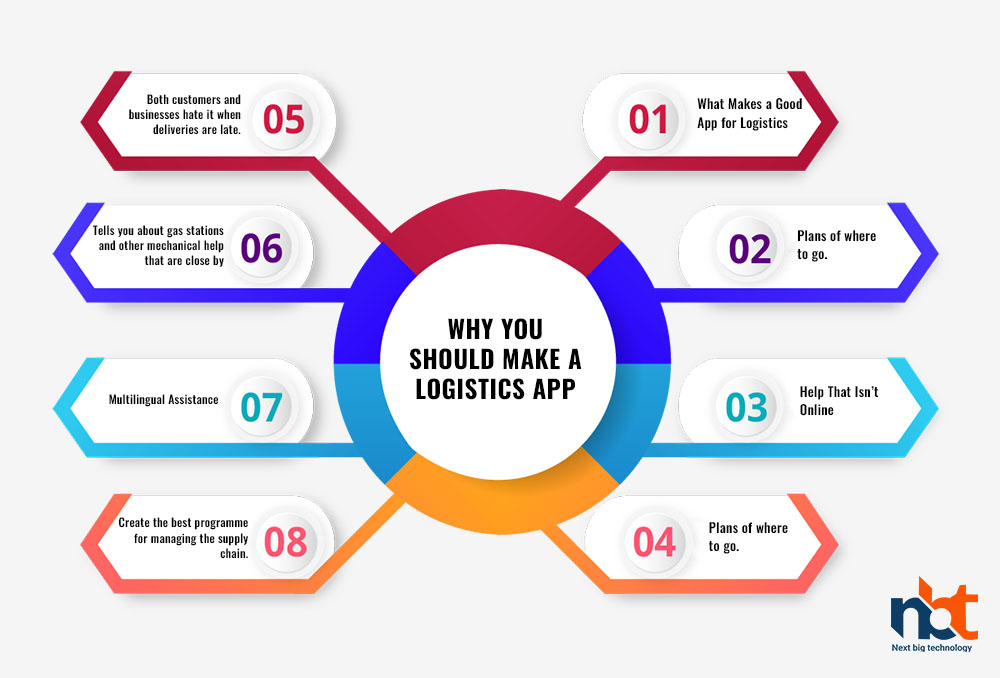When we a growing up, there were no apps. Those days are over, though. Most people today can’t even imagine what life was like before apps.
According to App Annie, 204 billion apps were downloaded worldwide in 2019. It is thought that there will be 258.2 billion downloads by 2022.
Table of Contents
Why you should make a logistics app
There are many ways in which a business can benefit from making a logistics app. Some examples are:
- GPS lets the driver know where the car is at all times.
- Keeping track of routes for better fleet management.
- Packages and cargo can be booked using systems similar to FedEx’s.
- Cargo can be tracked with the help of Near Field Communication (NFC) and Radio Frequency Identification (RFID).
- Keeping track of the warehouse’s stock, shipments, and other important information.
So, businesses are starting to use apps that meet their specific needs to streamline the many processes in a logistics company and be more open with their clients.
What Makes a Good App for Logistics
Here are some of the essential things that app developers should keep in mind when making a popular and valuable logistics app:
Also read : Cost and Features of Logistics Application Development
Keeping an eye on drivers and cars
At the moment, there is a part of logistics apps that is just for tracking vehicles. It is also an essential part of any real solution.
As an example, think about how popular it is for cars to have GPS tracking systems. Its market size in 2018 is expected to be more than 19000 units, worth about USD 600 million. 30% of these devices are used in the transportation and logistics fields.
So, how does one use the car and driver tracking feature? So, organizations can keep track of how well vehicles and drivers work. These features use GPS positioning in real-time, which makes them useful for evaluation.
Help That Isn’t Online
People with this optimistic view think that by 2020, internet outages will no longer be a big deal. It turns out that this is wrong.
Studies show that slow internet connections cost app developers more than $1.7 billion yearly. If an app has trouble loading, more than 70% of people will uninstall it. Using an offline app can help with this problem to some extent.
If you work in logistics, it’s essential that your app can be used even when you’re not connected to the internet.
Why? This is because most logistics work is done on highways that go through countries. Because of this, they will have to go to places where Wi-Fi is spotty or not there at all. Some areas in the U.S. are known for having bad internet connections.
Because of this, logistics apps need to be able to work even when they aren’t connected to the internet. For example, drivers should be able to send in their information from anywhere, even if they don’t have an internet connection. Every app for managing the supply chain needs to have this feature so that it can report on tasks accurately.
Plans of where to go.
Usually, services from companies like Uber include this feature. At the beginning of a trip, the driver is given a map showing the quickest and most direct way to get to their destination.
Both customers and businesses hate it when deliveries are late.
Without standardizing the routes drivers should take, there is no way to keep track of output. For example, a driver may decide to go the extra mile on his own.
As long as businesses and managers have access to the logistics software, they can plan routes ahead of time and give them to drivers. This helps make sure that deadlines for delivery will be met. Digital maps should be used with this feature so that directions are easy to follow.
When you add this to the initial monitoring function, your software can keep track of users’ commutes to ensure everyone stays on schedule.
Tells you about gas stations and other mechanical help that are close by
A driver may be a good reason to be late with a delivery or assignment. Companies need to have a plan to help drivers if their cars break down or run out of gas on the road.
Considering the needs of these drivers and companies, an app can be the best solution. The app should find gas and service stations and let the driver know where they are. Plus, they need to include all the locations’ contact information so that towing can start immediately if necessary.
The app should also track how much gas is used to warn the driver before a possible gas shortage. These changes can help the logistics app keep the fleet on track and ensure the goods are delivered on time, no matter what happens.
One app, Drivvo, is designed to help manage a fleet of vehicles in this way. This specialized app can be used as a model by developers who want to make a logistics solution that does everything.
Multilingual Assistance
Intercom found that 70% of customers would instead do business with a company that offered support in their native language. The same goes for apps, especially those that have to do with logistics.
By supporting many languages, the app makes it easier for people of all language backgrounds to use and access. Logistics apps need this feature so people from all walks of life can use them without trouble.
Also read : Developing a Logistic Mobile App? Keep These Features in Mind!
The efficiency of the logistics team can be improved by adding support for more than one language. This is because logistics apps tend to have more features and be more complicated than entertainment apps.
Create the best programme for managing the supply chain.
When you make a logistics app, you can take advantage of many different chances. It all comes down to just five simple but essential ideas.
This is what your logistics software should be able to do. By doing this, a product will be made that many logistics companies can use. Use only a reputable on-demand app development company to do the job. This is because logistics apps are much more complicated than apps in other fields.
MindInventory experts might be able to help in this case. Our dedicated app developers know what’s going on in the industry and what consumers want.
No matter who you hire to do the work for you, you must deliver a flawless logistics app if you want to get a significant share of the market in this space.
Thanks for reading our post “Developing a Logistics App – Key Features”, please connect with us for any further inquiry. We are Next Big Technology, a leading web & Mobile Application Development Company. We build high-quality applications to full fill all your business needs












